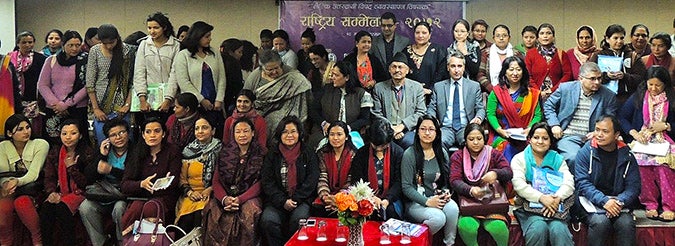Women in Gender Responsive Disaster Management
Date:

Remarks during closing by Ziad Sheikh, UN Women Representative.
for the National Women's Conference on Women in Gender Responsive Disaster Management | 1-2 March 2016, Kathmandu, Nepal
Honourable Mr. Shakti Basnet, Ministry of Home Affairs, Dr. Bishnu Bhandari, National Reconstruction Authority, Chairperson Chandani Joshi, distinguished guests, ladies and gentlemen, good afternoon and namaste.
It gives me great pleasure to be here today as this conference provides an important opportunity to discuss the different aspects of gender responsive disaster management. I would also like to take the opportunity to congratulate Ms. Sharmila Karki and Ms. Bhawani Rana for being nominated in the Advisory Council of the NRA. I would like to thank the women’s group and women from the districts for sharing your experiences. I know it is not easy for many of you, who have faced severe losses. It is extremely important for all of us to learn from your experiences and integrate that knowledge into our programme. Thank you also to Core Group of the Women’s Group working on disaster and to Jagaran Nepal for your leadership and excellent coordination.
Disasters have been found to reinforce, perpetuate and increase gender inequality and women’s potential contributions to disaster risk reduction are often overlooked and female leadership in building community resilience frequently disregarded. The Sendai Framework for Disaster Risk Reduction (2015–2030) Guiding Principles state that “A gender, age, disability and cultural perspective should be integrated in all policies and practices, and women and youth leadership should be promoted.” Strengthening the role of women and girls in disaster risk reduction is critical for achieving gender equality and empowerment and building disaster resilience of communities. Further to these, the Convention on the Elimination of All Forms of Discrimination against Women (CEDAW) upholds women’s right to participate in public life, while the Beijing Platform for Action calls for removing barriers to equal participation. UN Women is supporting civil society organizations in jointly drafting the CEDAW Shadow Report to allow for a different perspective on the implementation status of CEDAW provisions and the Government's gender equality commitments. We are glad that a separate chapter on gender and disaster is being considered on the Shadow Report.
Harnessing the potential of women – half of the world’s population – is vital. Emergencies should not be the exception. Women are critical partners for success, and they have the right to participate in the decision-making on how and where resources should be allocated. Women do not only have useful skills and knowledge to contribute, but also relevant social information about their communities. Their contributions can strengthen the collective resilience to future shocks and disasters. Women deserve equal opportunities to play an active role in designing the future of their communities.
After the devastating earthquakes, in its first time playing a humanitarian role, UN Women Nepal supported women’s organisations to develop a Common Charter of Demands for gender equality and women’s empowerment in the humanitarian response. UN Women, through its established partnership with women’s groups, distributed non-food items, provided psychosocial counselling and established five multi-purpose women centres and three information centres reaching approx. 42,703 affected women. It made significant contributions to humanitarian results by ensuring the Government and UN’s response to the 2015 earthquakes integrated women’s empowerment and gender equality. With the National Planning Commission and Ministry of Women Children Social Welfare, UN Women’s technical assistance led to an engendered Post Disaster Needs Assessment (PDNA), with a dedicated Gender Equality and Social Inclusion (GESI) Chapter, ensuring both gender-responsive sectoral and overarching recovery strategies. Lessons from Nepal provide essential guidance for ongoing efforts in Nepal, the region, and globally to ensure that gender equality and women’s empowerment is central in humanitarian action.
The post-disaster recovery and reconstruction presents an opportunity to redress inequalities through the allocation of financial and human resources. The Government’s long-established and institutionalized principles and practices in gender-responsive budgeting (GRB) needs to be applied to all the recovery strategies. We need ensure the meaningful participation of women in various commissions and government bodies, including the National Reconstruction Authority. The constitution already ensures the fundamental right of women to participate in all state organs on the basis of the proportional inclusion principle – this principle should be extended in the reconstruction efforts as well. Women’s participation and leadership are critical to effectively manage disaster risk and to design and implement gender-sensitive disaster risk reduction policies, plans and programmes.
This conference together with the Common Charter of Demands for Gender Equality and the Empowerment of Women in the humanitarian response and the Kathmandu Declaration on disaster risk management announced today give us vital guidance on gender in disaster and inform the Government of Nepal. Experiences from Nepal will also inform UN Women Asia-Pacific Regional Conference on gender and risk reduction to be held in April 2016 in Viet Nam regarding the use of sex and age disaggregated data (SADD) in DRR programming in South Asian context, the capacity of national women’s machineries to participate effectively in DRR dialogue and practice and mainstreaming gender equality into policy development. In May, women’s groups from Nepal will be attending the World Humanitarian Summit held in Turkey.
In addition, Nepal’s experiences will aim at contributing to the Asia Ministerial Conference on Disaster Risk Reduction (AMCDRR) to be held in New Delhi on 14 – 17 November, 2016 where the best practices and recommendations to strengthen the capacity of South Asian governments and national women’s machineries to ensure the integration of gender equality issues into disaster preparedness and risk reduction initiatives will be discussed.
As UN Women Executive Director has said: “investing in women is not only a matter of fundamental human rights, it is also a matter of liberating an enormous force for economic, social and cultural growth. We cannot afford to lose the potential of another generation of women. Investing in programmes and policies that benefit women and girls is the way forward.”